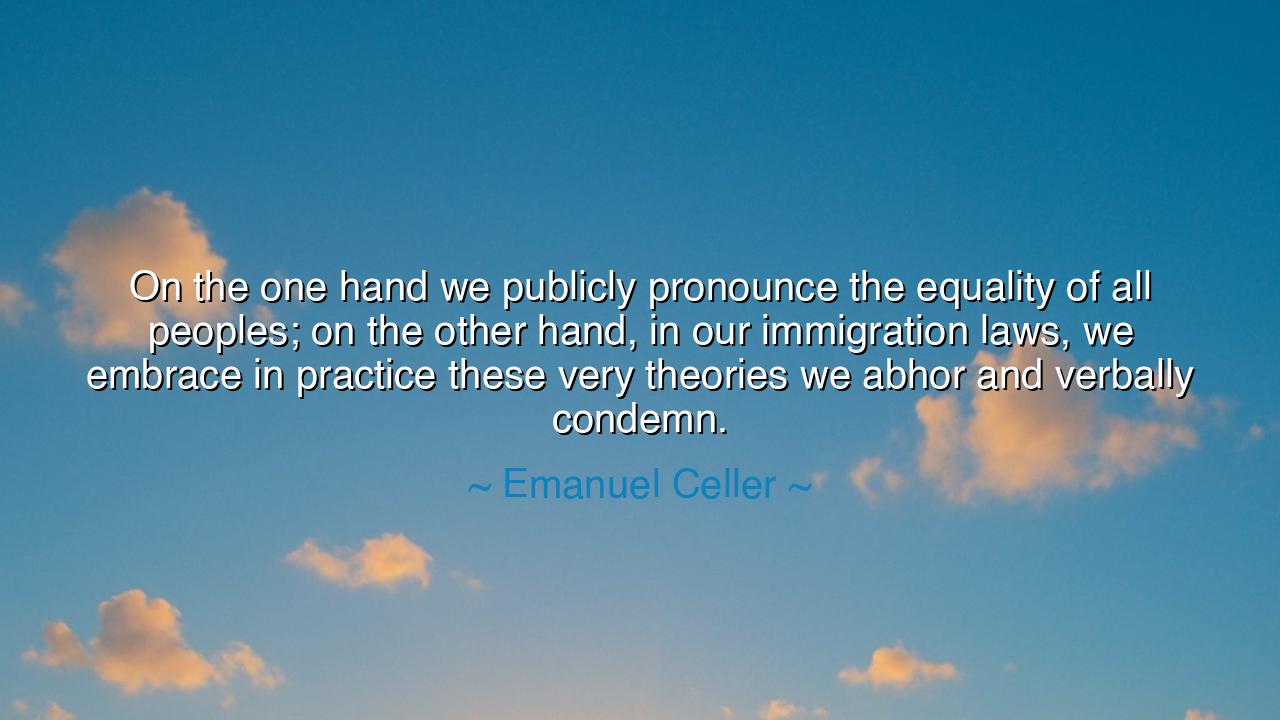
On the one hand we publicly pronounce the equality of all
On the one hand we publicly pronounce the equality of all peoples; on the other hand, in our immigration laws, we embrace in practice these very theories we abhor and verbally condemn.






In the piercing and courageous words of Emanuel Celler, we hear the cry of conscience against the hypocrisy of nations: “On the one hand we publicly pronounce the equality of all peoples; on the other hand, in our immigration laws, we embrace in practice these very theories we abhor and verbally condemn.” This is not the speech of an idle critic, but the lament of a man who loved his country too deeply to flatter it. His words expose the ancient chasm between principle and practice, between what humanity declares in the light and what it does in the shadows. For to preach equality while denying it in action is to wound both truth and honor. Celler’s voice calls across generations, warning that justice must be more than a word—it must live in law, in deed, and in the heart of every nation that claims to be free.
The origin of this quote lies in the mid-twentieth century, during the long battle over America’s immigration policies. Emanuel Celler, a congressman from New York and one of the architects of modern civil rights and immigration reform, spoke these words in protest against the National Origins Act of 1924, a law that set quotas favoring immigrants from northern Europe while shutting out much of Asia, Africa, and southern and eastern Europe. It was a law built upon the cold logic of racial hierarchy, a relic of pseudo-science that divided mankind into ranks of worth. Yet the very nation that passed it was the same that had declared “all men are created equal.” Celler saw this contradiction as a moral disease—a sickness that could not be healed until America’s laws reflected its ideals.
At its core, Celler’s declaration is not only about immigration, but about the soul of democracy. It asks every generation a timeless question: Can a nation truly be free if its laws are bound by prejudice? He understood that the greatness of a people lies not in the power of their words, but in the consistency of their conscience. To claim equality for all and then deny it to the stranger, the refugee, or the foreign-born is to betray the sacred covenant of liberty. For the measure of justice is not how a nation treats its majority, but how it treats those who stand at its gates, seeking only hope.
History offers a living mirror for Celler’s warning. In the years following World War II, when millions fled the ruins of Europe, the United States hesitated to open its doors. Fear, suspicion, and the old ghost of racial hierarchy lingered still. Yet men like Celler fought to awaken the conscience of Congress, arguing that if America truly believed in human equality, then its laws must welcome not by color or creed, but by character and capacity. His struggle bore fruit in the Immigration and Nationality Act of 1965, which abolished the discriminatory quota system and opened the nation to a richer, more diverse humanity. Thus, Celler’s words became prophecy fulfilled: the day when law and principle finally stood side by side.
But his wisdom does not belong to history alone. Even today, the world wrestles with the same conflict—between what it proclaims and what it practices. Nations speak of human rights, yet turn away those who seek refuge. They celebrate diversity, yet erect walls of fear. Celler’s insight remains a mirror for our age: progress means little if equality remains a slogan rather than a standard. The danger he warned against is eternal—the comfort of fine words masking the cruelty of injustice. The hypocrisy he condemned still thrives wherever pride silences compassion, and policy forgets the humanity it governs.
Celler’s message, then, is not condemnation but awakening. He calls each citizen to bridge the gap between belief and behavior, between promise and performance. To live by his words is to act with integrity—to ensure that what we affirm in our hearts is reflected in the world we build. It is a call to leaders to write laws that uplift, not divide; to teachers to raise generations who see humanity, not hierarchy; and to individuals to live daily as citizens of conscience, not of convenience.
So let this teaching be carried forward as a guiding flame: Equality must be practiced, not proclaimed. Let no nation, and no person, rest in the comfort of contradiction. To honor liberty, one must extend it; to cherish justice, one must enact it. The truest patriot is not the one who flatters his country’s virtues, but the one who confronts its failings in hope of redemption. As Emanuel Celler reminds us, words without deeds are hollow, but when principle and practice walk hand in hand, a nation becomes not only prosperous, but righteous.
And thus, from the voice of a humble legislator comes a lesson for all generations: the greatness of a people is not in what they claim to believe, but in how they treat the least among them. When law and love move as one, equality ceases to be an ideal—it becomes a living truth, written not only in constitutions, but in the hearts of humankind.






AAdministratorAdministrator
Welcome, honored guests. Please leave a comment, we will respond soon